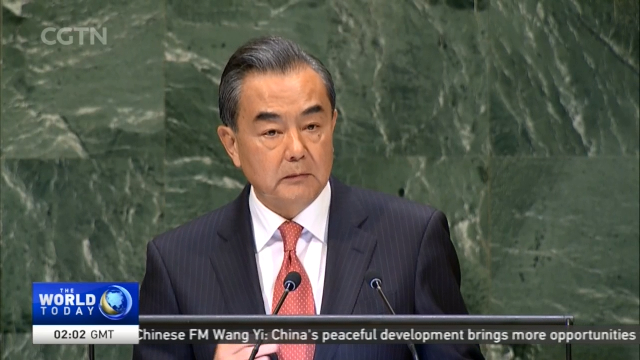
11:08, 29-Sep-2018
UN General Assembly: Chinese FM Wang Yi champions multilateralism in speech
Updated
10:50, 02-Oct-2018
02:57

Now to the United Nations General Assembly in New York. China's State Councilor and Foreign Minister Wang Yi has given a ringing endorsement to multilateralism. In a speech addressing the gathering of world leaders, Wang also warned against a return to the "law of the jungle" in international affairs. Meanwhile, Wang told the Council on Foreign Relations in New York that China has no plans to replace the US as the world's leading power. CGTN's Nathan King has this report from the United Nations.
This speech was a full-throated defense of the United Nations - and a multilateral, rules-based global order - in the face of growing challenges and difficulties.
WANG YI CHINESE FOREIGN MINISTER "Equality, mutual trust and win-win cooperation are the call of our times, whereas power politics and the rule of the jungle find no support."
Without citing the U.S. tariffs and Washington's criticism of Chinese trade and industrial policies, Wang defended China's record of reform and opening up. He also reminded the assembly of China's contribution as an engine of growth in the global economy.
WANG YI CHINESE FOREIGN MINISTER "China stayed true to its commitment throughout the negotiation process on its return to the GATT and then accession to the WTO-negotiations that lasted 15 long years, and were concluded at a certain price. China fulfilled its promise and integrated itself into the world economic system. After the international financial crisis broke out, China chose not to stand idly by, but to work together with other countries to tide over the rough times. For years running, China has contributed over 30% of global growth."
And there was a warning to Washington too.
WANG YI CHINESE FOREIGN MINISTER "China will not be blackmailed or yield to pressure."
Wang also highlighted China's development agenda - enshrined in the Belt and Road initiative - and his nation's commitment to sustainable development and the Paris climate agreement.
He reiterated China's support for the Iran nuclear deal. He endorsed renewed diplomacy to achieve denuclearization on the Korean Peninsula. And, he said solving problems in Myanmar's Rakhine state will require a cessation of violence, the return of refugees, and economic development.
Earlier, Wang Yi visited the prestigious Council on Foreign Relations, where he dismissed U.S. claims that China wants to displace the U.S. as the leading global power.
Wang stressed China wants a peaceful, harmonious rise-and said current difficulties with the U.S. could be solved.
NATHAN KING UNITED NATIONS, NEW YORK "But when these differences will be solved is a big question. There is no schedule. But given that there are no scheduled talks between the U.S. and China on the trade war - and increasingly anti-Chinese rhetoric coming from the White House - it's difficult to see how the current difficulties between Washington and Beijing will be solved. Wang Yi offered no timeline, but remains hopeful. Nathan King, CGTN at the United Nations in New York."

SITEMAP
Copyright © 2018 CGTN. Beijing ICP prepared NO.16065310-3
Copyright © 2018 CGTN. Beijing ICP prepared NO.16065310-3